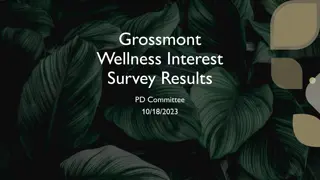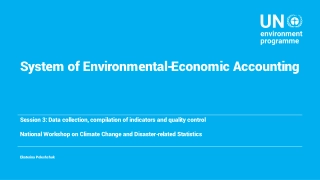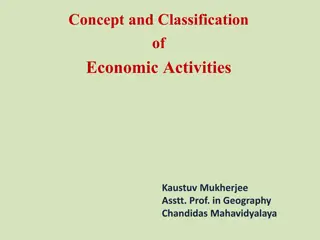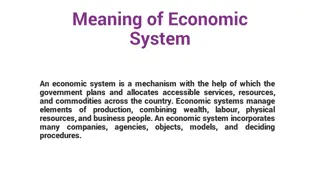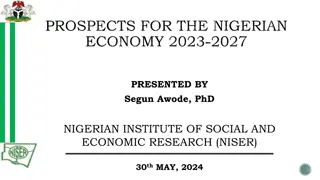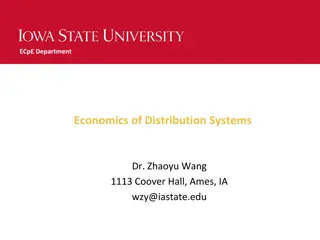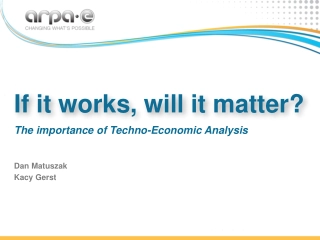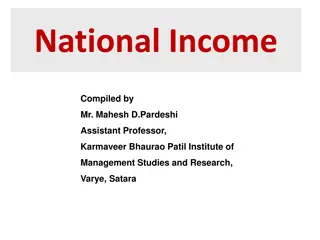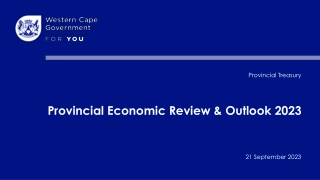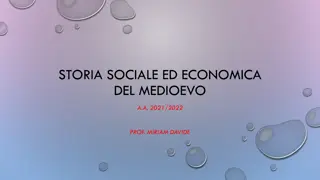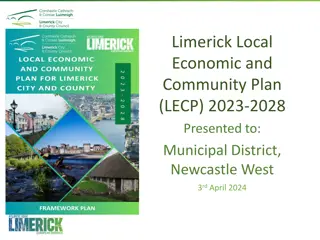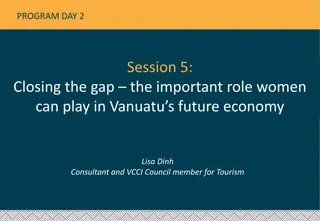Understanding Services of General Economic Interest in the EU
Public financial support for Services of General Economic Interest (SGEI) plays a crucial role in achieving social economy objectives. This involves clarifying the concept of SGEI under EU law, notification requirements to the Commission, specific provisions in the EU legal framework, and examples of successful SGEI implementation across Member States.
Download Presentation
Please find below an Image/Link to download the presentation.
The content on the website is provided AS IS for your information and personal use only. It may not be sold, licensed, or shared on other websites without obtaining consent from the author. Download presentation by click this link. If you encounter any issues during the download, it is possible that the publisher has removed the file from their server.
Presentation Transcript
Services of General Economic Interest Key take aways of the thematic discussion paper Juan Jorge Piernas L pez | Thematic expert
Introduction Public financial support can be granted to compensate for the provision of Services of General Economic Interest (SGEI) that pursue social economy objectives. The workshop will first clarify the concept of SGEI under EU Law and whether the granting of public support in this context amounts to State. The workshop will also explain if compensation for SGEI provision has to be notified to the Commission and, if so, under which conditions it can be lawfully granted. The workshop also aims to identify and describe the specific provisions of the EU Legal framework concerning SGEI that can be used to foster the social economy goals. Finally, the workshop will discuss the practice and indications of the European Commission concerning social SGEI and include concrete examples from several Member States that used SGEI to successfully support the social economy.
What is a Service of General Economic Interest? Examples include healthcare, education, public transportation, social housing, water supply, childcare services, or telecommunications services important for the economic, social, and cultural development of society SGEI are economic activities which deliver outcomes in the overall public good that would not be supplied (or would be supplied under different conditions in terms of quality, safety, affordability, equal treatment or universal access) by the market without public intervention available and accessible to the entire population - especially those in need Large margin of discretion for public authorities (only manifest error control) Member States must clarify the reasons why the service in question differs from other economic activities Carry out special tasks in the public interest
2.1 SGEI fundamentals If the compensation is State aid, does it have to be notified to the Commission? Is compensation granted for the provision of SGEI State aid? No advantage (and thus aid) if the conditions established by the Court of Justice in the Altmark judgment are met: No if the compensation complies with: SGEI de minimis regulation SGEI Decision Entrustment Act: legally binding public act that formally entrusts a company with a specific service (e.g. a contract) If the compensation does not meet the de minimis or SGEI Decision criteria? No aid either if any of the other conditions of Article 107(1) TFEU are not met, e.g. lack of effect on trade, distortion of competition economic activity / undertaking. Parameters of compensation: define in advance the costs associated with provision of SGEI + revenues + reasonable profit Then it will be assessed under the SGEI Framework (compatibility guidance) Avoid overcompensation: the compensation must not exceed what is necessary to cover the costs + reasonable profiit. Selection of SGEI provider: appropriate open and transparent tendering procedure at the least cost to the community or through a benchmarking exercise.
2.1 SGEI fundamentals SGEI de mininis regulation SGEI Decision compensation not exceeding EUR 500,000 over any period of 3 fiscal years. State aid > EUR 500K up to EUR 15 million per service per year (social services no limit see next slides). compensation (up to the ceiling) can be provided as a grant, a loan or a loan guarantee. Compensation can cover net costs + reasonable profit beneficiary undertaking should be entrusted in writing + 1) prospective amount of aid and 2) de minimis nature. A return on capital not exceeding the relevant swap rate plus 100 basis points may not be granted to undertakings in difficulty Content of entrustment is more detailed than in de minimis SGEI Regulation and duration < 10 yearss No verification of the costs incurred in providing the service and thus no need to check for overcompensation. No public tender procedure required to select providers
2.1 SGEI fundamentals (SGEI Framework) Compensation beyond EUR 15 million per service per year (apart from social services) Member States cannot attach public service obligations to services that are already provided or can be provided by the market. Duration should not exceed the period required for the depreciation of the most significant assets to provide the SGEI. More precise guidance on reasonable profit EU public procurement rules must be complied with Negative effects Positive Effects
2.1 State aid fundamentals SGEI Analysis Tree Yes SGEI de minimis aid No Is one of the following three conditions met? -non-economic activity -no effects on trade -the four (cumulative) criteria of the Altmark judgment: 1. Entrustment act 2. Parameters for calculating compensation objective and transparent 3. No overcompensation 4. open / restricted public procurement procedure, OR compensation based on costs of a well-run undertaking Yes No aid No Yes Is the compensation lower than 15 million EUR? Are all the conditions of the Decision met? Yes No Yes Is the compensation for a hospital, social housing or social service? No aid Notification and overcompensation test (Section 2.11 of the Framework) Yes Incompatible aid No Compatible aid subject to conditions Yes Are all the conditions of the Framework met? (Overcompensation test, compliance with public procurement rules, efficiency incentives) Very serious competition distortions Yes No Compatible aid No Incompatible aid
2.2 SGEI and the social economy Social services under 2012 SGEI Commission Decision Implications for social services Member States can grant as much compensation as they consider necessary for the provision of these services Article 2(1)(c) 2012 Commission SGEI Decision: significant amounts of State aid can be granted for the provision of services meeting social needs as regards : Other social services could receive compensation, but up to EUR 15 million under the SGEI Decision (or Framework) Health and long-term care. meeting social needs in Article 2(1)(c) does not restrict the services mentioned in the list (e.g. childcare) Childcare. social inclusion of vulnerable groups covers, e.g. services for people with disabilities, services for migrants, services for the homeless, parenting support services, services supporting over-indebted persons or LGBT social services. Access to and reintegration into the labour market Social housing and the care and social inclusion of vulnerable groups social and work integration enterprises also qualify as access to and reintegration into the labour market
3. Concrete examples and cases (National examples) Sweden Germany Greece Spain Poland Cover wage costs of staff who provide support to vulnerable persons integration process. Compensation for creating meaningful and empowering work for persons with disabilities. Special Actions to Integrate Young People with Disabilities into Employment. Creating and providing rented or cooperative housing to persons of moderate incomes. wage costs & integration grants for older workers. cover personnel costs of social enterprises for socio-educational support of long- term unemployed. organisation and operation of camps for vulnerable groups of the population. Aid to encourage the employment of vulnerable people by the beneficiary undertakings. Housing estate rental services entrusted by the municipalities to social housing associations. Compensation for organising and providing housing for the elderly. Compensation to cover the costs of subletting by higher education institutions. maintain and create rehabilitated, low- cost housing, Support for the entrepreneurship skills of individuals from vulnerable social groups. support for integration people with disabilities or mental health disorders. Subsidies for meals sold in milk bars .
3. Concrete examples and cases (COM Evaluation) Social housing and Reasonable profit Absence of selective advantage Notion of aid Need to clarify/simplify further the rules to coherence between the general and the SGEI de minimis Regulations as regards the notion of single undertaking , and the application of the de minimis rules to undertakings in difficulty. The concept of social housing is considered as an obstacle in providing the SGEI adapted to the population s need. No State aid (and no need for SGEI) if: a) beneficiary supplies goods or services to a limited area and is unlikely to attract customers from other Member States; several public authorities experience difficulties with the concept of reasonable profit under the 2012 SGEI Commission Decision and Framework. Need for better coherence between primary law (Protocol, Treaty provisions, Charter provisions) and Pillar or Social Rights. a participant advocated for the specific recognition in the SGEI rules of operators active in the so-called social economy (i.e. where profits can be made but they will not be distributed to shareholders). b) it cannot be foreseen that the measure will have effect on of cross- border investments or establishment European Economic and Social Committee (EESC) requested guidance on reasonable profit in the case of social economy entities.
Conclusions Current EU SGEI rules open up significant opportunities for funding the activities of social economic entities Uncertainty concerning some notions, such as economic activity, effect on trade or reasonable profit, may be one of the factors explaining the lack of application of the SGEI framework to its full potential. The workshop has shown that significant public financial support can be granted to properly defined SGEI without qualifying as State aid or, if so, without notification to the European Commission. The workshop has also shown that specific provisions to social services apply, making the rules notably more flexible, and that the European institutions are aware of the specific features and needs of social economy entities.




